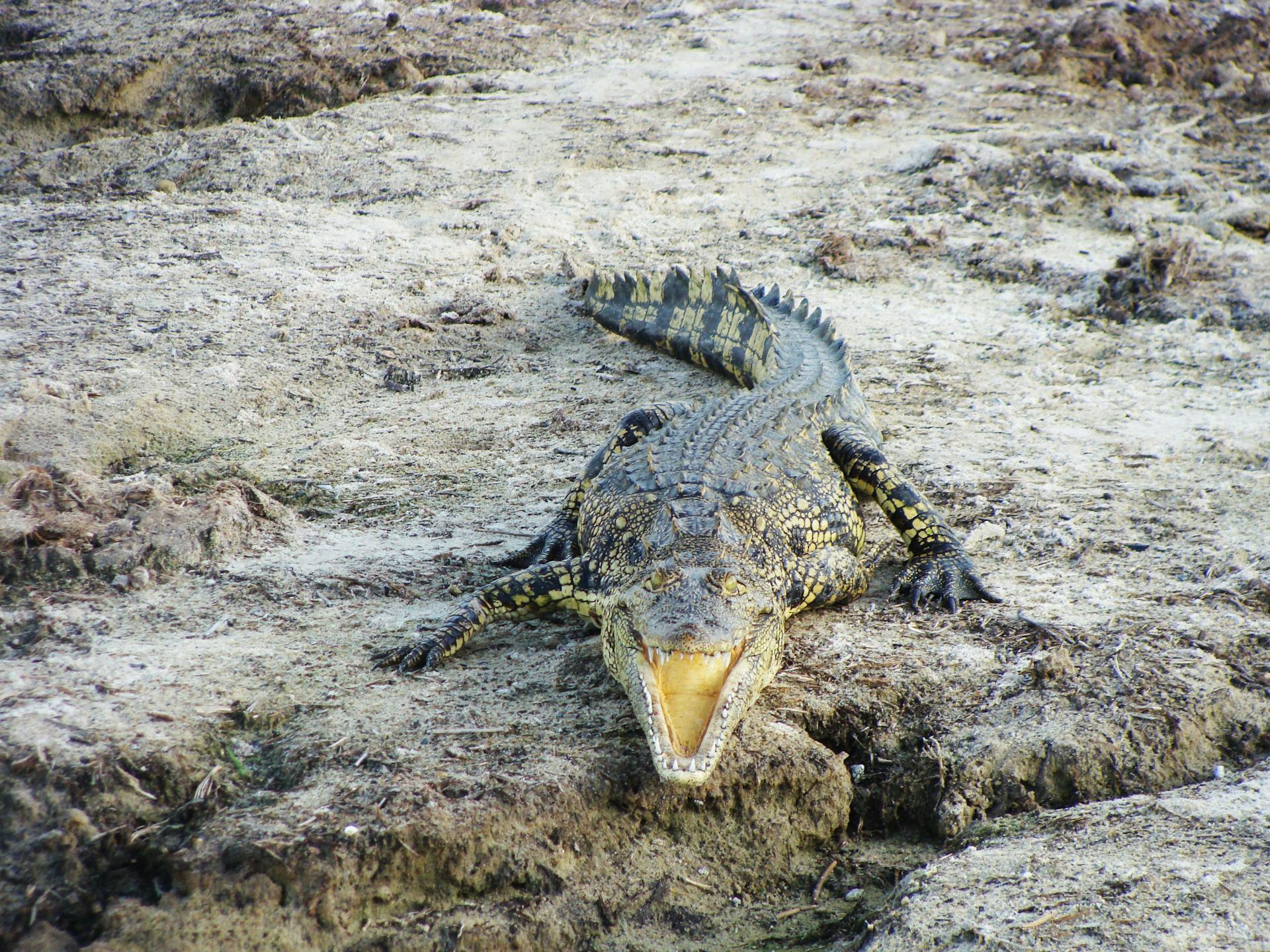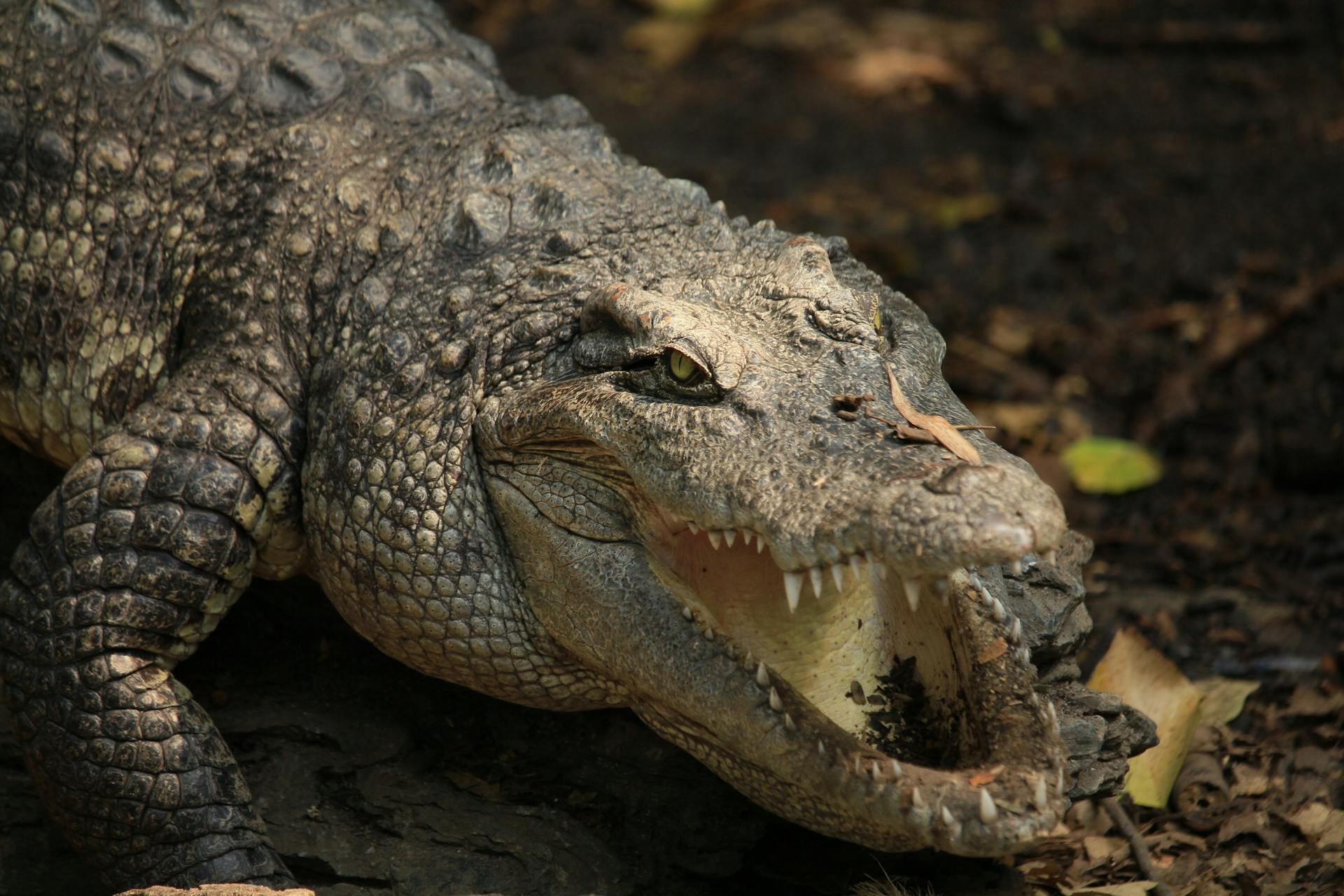
In a heartwarming display of unexpected friendship, three crocodiles banded together to save a dog from distress in an Indian river.
The incident occurred in a river, where the dog had apparently wandered into the water.
The crocodiles, who were likely attracted to the commotion, quickly sprang into action to rescue the dog.
Crocodiles Saving Dog
In a remarkable display of unexpected kindness, three crocodiles pushed a dog to safety in a river in India. The dog had been chased into the river by a pack of feral dogs and was left stranded in the territory of the three large crocodiles.
The crocodiles, known as "muggers", could have easily devoured the dog, but instead, they guided it out of the river and onto the shore. They even nudged the dog towards the bank, implying that their hunger drive was absent.
The researchers who observed this incident suggest that the crocodiles may have shown "emotional empathy", which is the ability of one species to experience the emotional feelings of another. This behavior is not commonly seen in crocodiles, and it has sparked a lot of interest in the scientific community.
The crocodiles in this incident were adult males, which can grow up to 18 feet long and weigh up to 1,000 pounds. Despite their size, they showed a gentle and docile behavior towards the dog, which is a remarkable display of their complex behavior.
The researchers who studied this incident believe that it highlights the need for more research on the mental capabilities of crocodiles. They are intelligent animals that have been underestimated for a long time, and this incident shows that they are capable of complex behaviors.
Dog in Distress
A dog in distress is a heart-wrenching sight, but in one remarkable instance, three crocodiles came to the rescue of a young pup in India. The dog was chased into a river by a pack of feral dogs and was left stranded in the territory of three large crocodiles.
These crocodiles, known as "muggers", could have easily devoured the dog, but instead, they guided it to safety. The researchers observed that the crocodiles were actually touching the dog with their snout and nudging it to move further for a safe ascent on the bank and eventually escape.
The crocodiles' behavior was all the more remarkable given that they were well within striking range and could have easily attacked the dog. However, it seemed that their "hunger drive was absent", suggesting that they may have been motivated by something other than a desire to eat the dog.
In Indian River

In Indian River, a remarkable incident unfolded when three mugger crocodiles, also known as marsh crocodiles, helped a young dog in distress.
The dog was chased into the river by a pack of feral dogs and was left stranded in the crocodiles' territory.
Waiting in the shallow water were three adult crocodiles that "could have easily devoured" the canine.
These crocodiles approached the dog, but instead of attacking, two of them guided the dog not only out of the river, but away from the bank where the aggressive feral dogs were waiting.
The researchers observed that the crocodiles were actually touching the dog with their snout and nudging it to move further for a safe ascent on the bank and eventually escape.
The crocodiles' behavior seemed to suggest that their "hunger drive was absent", and the researchers speculated that it could be evidence of "cross species 'emotional empathy'" in the reptiles.
On two other occasions, however, crocodiles in the river "preyed upon" stray dogs, highlighting the complex nature of their behavior.
On a similar theme: Feral Dog vs Stray Dog
Stranded

In India's Savitri River, a young dog was chased into the water by a pack of feral dogs.
The dog was then approached by three adult crocodiles, which could have easily devoured it.
However, instead of attacking, the crocodiles guided the dog out of the river and away from the bank where the aggressive feral dogs were waiting.
These crocodiles were actually touching the dog with their snout and nudging it to move further for a safe ascent on the bank and eventually escape.
The researchers don't know why the crocodiles pushed the dog to safety, but they speculate that it could be evidence of "cross species 'emotional empathy'" in the reptiles.
In fact, the crocodiles' behavior was so unusual that it has led scientists to suggest a greater need to study crocodile cognition.
Reptile biologist Duncan Leitch cautioned against reading too much into the observations, but the paper's authors argue that their findings are a significant discovery.

Crocodiles in the river have been observed to be "docile" on occasion, which is unusual behavior for such a large and powerful predator.
Adult male mugger crocs can reach 18 feet long and weigh up to 1,000 pounds, making them a formidable force in the water.
Despite their size, the three crocodiles in this incident chose to nudge the dog towards the bank instead of attacking it.
The researchers say that the hunger drive was absent in the crocodiles, which suggests that they were not motivated by a desire to eat the dog.
In fact, on two other occasions, crocodiles in the river "preyed upon" stray dogs, which highlights the complexity of their behavior.
The curious case of a dog "rescued" by the group of crocodiles reported here seems more on lines of empathy than altruistic behavior.
By studying the behavior of crocodiles, scientists hope to gain a better understanding of their cognitive abilities and emotions.
This could lead to a greater appreciation for these fascinating creatures and their place in the natural world.
Researchers Suggest Empathy
Researchers have suggested that the behavior of the three crocodiles could be a display of "emotional empathy" towards the dog.
The incident occurred in the Savitri River in Maharashtra, India, where a young dog was chased into the river by a pack of feral dogs.
The three adult crocodiles, also known as marsh crocodiles, approached the dog but instead of attacking, they guided the dog to safety.
Two of the crocodiles were seen touching the dog with their snouts and nudging it to move further for a safe ascent on the bank.
The researchers noted that the hunger drive of the crocodiles seemed to be absent, which is unusual behavior for these animals.
The incident has sparked interest in the mental capabilities of crocodiles, with researchers suggesting that they may be more intelligent than previously thought.
Reptile biologist Duncan Leitch cautioned against reading too much into the observations, but the paper's authors argue that their findings suggest a greater need to study crocodile cognition.
The researchers also noted that on two other occasions, crocodiles in the river "preyed upon" stray dogs, indicating that this behavior is not a one-time occurrence.
Sources
- https://nz.news.yahoo.com/crocodiles-spotted-pushing-dog-river-192159468.html
- https://www.huffpost.com/entry/crocodiles-save-dog-river_n_650f062ee4b0514b6895a817
- https://www.ladbible.com/news/animals/three-crocodiles-saved-dog-india-458460-20230924
- https://au.news.yahoo.com/crocodiles-push-stray-dog-safety-140725396.html
- https://www.outkick.com/culture/three-crocodiles-save-dog-stranded-in-a-river-in-india
Featured Images: pexels.com


